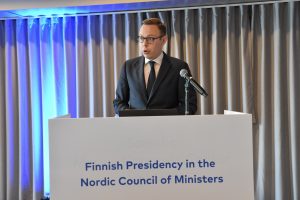Right now, around 40 trade unions, municipalities, organisations and government agencies are preparing their consultation responses to the final report “Labour market crime – structure – tools and measures – continued work”.
The report has been prepared by the Delegation against labour market crime. It has presented several interim reports since 2021, including proposals to ease confidentiality rules between agencies.
The final report contains many proposals. The criminal economy, of which labour market and welfare crime form a part, is a government priority. This is also reflected in the upcoming budget, which earmarks 400 million Swedish kronor (€36.3m) to address this particular issue.
Read this article in Swedish on our Arbeidsliv i Norden.
Amir Rostami is a professor of criminology at Södertörn University. He has worked with organised crime for years and sees it as his task to communicate new knowledge which might help different stakeholders understand the issues and implement relevant and effective measures.
He has also been one of the participants on the large delegation against labour market crime, which gathered experts and societal actors from public authorities and organisations that deal with labour market and welfare crime.
Amir Rostami wants to highlight the importance of evaluating the measures being implemented.
“Evaluations often fall by the wayside. Other matters get the attention while follow-ups get neglected. The report also clearly highlights the breadth of labour market crime and that it is linked to organised crime.
“Labour market crime is absolutely an important economic source for organised crime – we have not always considered that angle in Sweden.”
Labour market crime, welfare crime, corporate crime and other types of criminality all fall under one umbrella – the criminal economy. But it might make sense to make some distinctions, believes Amir Rostami.
“It is good to put labels on different problems. Since they fall within different areas of responsibility, it is important for clarity, governance and accountability. However, the different types of crime all fall under a common umbrella – the criminal economy,” he says.
Not a new phenomenon
Labour market crime is about the exploitation of people, cheating with workplace conditions, breaching regulations and breaking labour market rules in other ways.
The aim is to grab money, and there is a great risk that what is delivered is sub-standard and that people will suffer.
Some of the labour market criminal activity is directly linked to organised crime, while there are also more indirect connections, according to Amir Rostami.
“Human trafficking and people smuggling are activities that are dependent on organised crime infrastructure, so you could say that labour market crime is both directly and indirectly part of organised crime’s portfolio of sources of income,” says Amir Rostami.
Undeclared labour is one of the largest sources of income in the criminal economy and costs society around 100 billion Swedish kronor (€9 billions) a year. It is, however, difficult to ascertain how much of this is linked to organised crime.
Amir Rostami also points out that labour market crime is not a new phenomenon. Tax crime and welfare crime have been debated for decades and have always been seen as a threat to the system.
“When cheating and exploitation become widespread and normalised, it doesn’t just impact individuals and vulnerable groups, but the very trust we have in the system – which makes it a threat to the system,” says Amir Rostami.
What is new is that both politicians and stakeholders see labour market crime as part of a bigger whole, he believes. And in the final report, the phrase “continued work” is also included in the title.
“Both the delegation and the “Sweden against organised crime” initiative show how trade unions, businesses and authorities sit around the same table trying to solve these problems. There is a shared understanding on this, and often also agreement on the measures. Things are going in the right direction,” says Amir Rostami.
Seven regional centres, inspired by Norway
One example of existing cooperation is the seven centres for fighting labour market crime, which can be found around Sweden. These were established on a model from Norway.
The nine agencies that cooperate in the fight against labour market crime are the Swedish Work Environment Authority, the Public Prosecutor’s Office, the Swedish Tax Agency, the Gender Equality Agency, the Swedish Public Employment Service, the Swedish Migration Agency, the Swedish Economic Crime Authority, the Swedish Police Authority and the Swedish Social Insurance Agency.
The cooperation between the agencies happens on several levels. The director generals have their own network, just as there is a network for top managers. The seven centres are housed within the police authority.
Staff from all nine agencies sit together, working on common solutions when dealing with suspected criminality.
Together, they have performed 18,000 joint workplace inspections since the start in 2018. They have uncovered undeclared labour, extremely hazardous working conditions, human exploitation, welfare fraud and other serious crimes.
They have witnessed human suffering affecting many people as a result of regulations being ignored, or people who work without legal or union protection.
They have also seen the financial impact of these crimes. In 2024 alone, government inspections recovered 91 million Swedish kronor (€8.2m) through economic repayments and halted disbursements.

Arne Alfredsson, who has worked at the Swedish Work Environment Authority since 2002 and has been head of agency cooperation since 2019, sees abundant evidence of the consequences when the rules and laws governing working life are broken.
“Labour market crime is a threat to both serious companies and individual workers. We see that our cooperation is having a clear effect.
“More inspections and stricter methods have allowed us to identify more crimes and to develop our joint agency efforts to ensure fair competition. Nobody should have to work under unsafe or illegal conditions,” says Arne Alfredsson.
The most vulnerable sectors are cleaning, restaurants, massage and beauty salons, transport, car washes, and green industries.
Creative and evolving criminality
Research shows that criminals exchange experiences and learn from each other, and that collaboration exists within the criminal world. The Swedish Work Environment Authority also sees how criminal activity is in constant motion.
“There is no doubt about it, especially when it comes to human trafficking. Many of the criminals are very resourceful, and sometimes I wish they were operating in the business sector instead, just because of their creativity,” says Arne Alfredsson.
Criminal activity is now also seeking out new avenues and industries. One example is dental care.
“Our systems are built on trust in people who are running businesses, and when we see that trust being abused, we become concerned. We need new control systems in areas where previously there were none,” he explains.
The cooperation between the nine agencies also involves informing the public about what labour market crime is, and increasing awareness of how, knowingly or not, citizens contribute to that kind of criminality.
Recently, the top leaders for the nine agencies published an opinion piece where they encouraged the public to think again when a product or service is offered at a low price.
If a car wash is 100 kronor, or a nail salon charges just a few hundred, something is not right, points out Arne Adolfsson.
Labour market crime is a major problem for serious players. Arne Alfredsson provides an example: If you are building a house, fixed fall protection is needed. This costs between 50 and 100 000 kronor (€4,500 – €9,000). If a company skips that requirement, it can offer a far lower price.
“A serious construction firm has no chance of competing with that, and this is why it is so important to follow the rules of the game. Fair competition is absolutely crucial,” he says.
Municipalities still have some way to go
Municipalities and regions represent one area that has not been properly covered by the seven centres working against labour market crime.
One of the challenges is confidentiality rules that hinder information exchange. However, many municipalities and regions are taking action against this type of crime themselves.
Lena Törneskär works as a strategist in the fight against welfare crime in Eskilstuna municipality. This also includes measures against labour market crime.
She analyses crime risks alongside eight administrations and four municipal companies.
Fraud and misconduct can be found in the delivery of personal assistance for people in need of support, social benefits, association grants, home care services, and public procurement, where companies fail to deliver what they promise.

“We work based on the supervisory duty we have according to the law, often together with the police and other state authorities. We find shortcomings in many different types of companies. These may involve building permits, fire safety and restaurant businesses.
“Food Act violations are also our responsibility. For example, last year we seized half a ton of expired meat,” says Lena Törneskär.
She is a political scientist with a background from the police authority, where she has been an analyst in the intelligence service. She has also worked as an investigator of wrongful payments in social services, benefit fraud in other words. As a municipal official, she is not surprised by the existence of crime.
“What does surprise me is that the municipality still has such a long way to go. There is a great responsibility resting on us, but we lack the competence and resources to detect crime.
“We work with discovery-based crime, meaning no one voluntarily raises their hand to report an incorrect address or the selling of expired goods. We have a long journey ahead to fully understand that,” she says.
The municipalities are focusing on their core operations. There is a desire to make quick decisions, be attractive and draw both businesses and people to the municipality. The focus is on building trust between citizens, companies and the municipality.
“It is not so easy to add welfare crime to this, to understand that we as a municipality are victims of crime and often a complicated kind.
“The social contract is not the same as it used to be. That’s why we must safeguard our operations with controls and not just rely on people’s honesty,” says Lena Törneskär.
She sometimes notices an almost reluctant attitude when she tries to introduce a more risk-based way of working, and finds it hard to bring labour market and welfare crime issues to the fore.
This is partly because it is burdensome to introduce more control mechanisms, and partly because of a mindset among those working with core operations that they “already have ten thousand tasks to tend to.”
“Procurement in health and social care is the big challenge. Personal assistance is also a high-risk area. This is where you find employment of family members, excessively long working hours, working hour fraud or exaggerated care needs.
“The difficult part is creating awareness of the risks of being exposed to welfare crime and what the consequences are for a municipality.
“That’s why managers must step forward and support employees, making welfare crime a prioritised area to combat,” says Lena Törneskär.
She also cooperates with the Swedish Association of Local Authorities and Regions (SKR), the National Council for Crime Prevention, six municipalities around Lake Mälaren, and the police.
“Our cooperation has helped raise awareness of the risk of crime. A lot is being done, but not enough.
“Those who commit crimes don’t have to follow any laws, but can simply continue, while municipalities must acknowledge that crime is a real problem. That understanding doesn’t fully exist today,” says Lena Törneskär.
There are also disagreements over what to aim for. It takes time to be thorough, checking permits and benefits. This slows down the quick and efficient case handling that the municipality desires.
There might also be a fear of presenting the municipality in a negative light.
“It is important to understand these conflicts of interest and to talk about them. There is nothing wrong with being an attractive municipality and wanting to attract new companies, but we do want companies that have collective agreements and that follow the Work Environment Act,” says Lena Törneskär.
Hope and energy after all
Working with labour market and welfare crime might seem tough and demanding. Lena Törneskär says she sometimes feels disheartened by developments.
“Yet at the same time I feel we have taken many steps forward in a short period of time, so yes, I still have the energy for this,” she says.
Arne Alfredsson at the Work Environment Authority admits that he sometimes thinks “Where are we going and how will things be for our children and grandchildren?”
“At the same time, it is inspiring and fun to be part of preventing something that really threatens the system, so I am glad to be a part of this,” he says.
Amir Rostami believes it is possible to win the fight against the criminal economy.
“Yes, I would never have devoted myself to it if I thought it was completely hopeless. Perhaps you should not expect to be able to eliminate the problem, but we can reduce it so that the criminal economy no longer undermines the system.
“We can contain it by compensating for the damage and reducing the effects. If we don’t, this type of problem will sooner or later devour the state from the inside,” says Amir Rostami.







